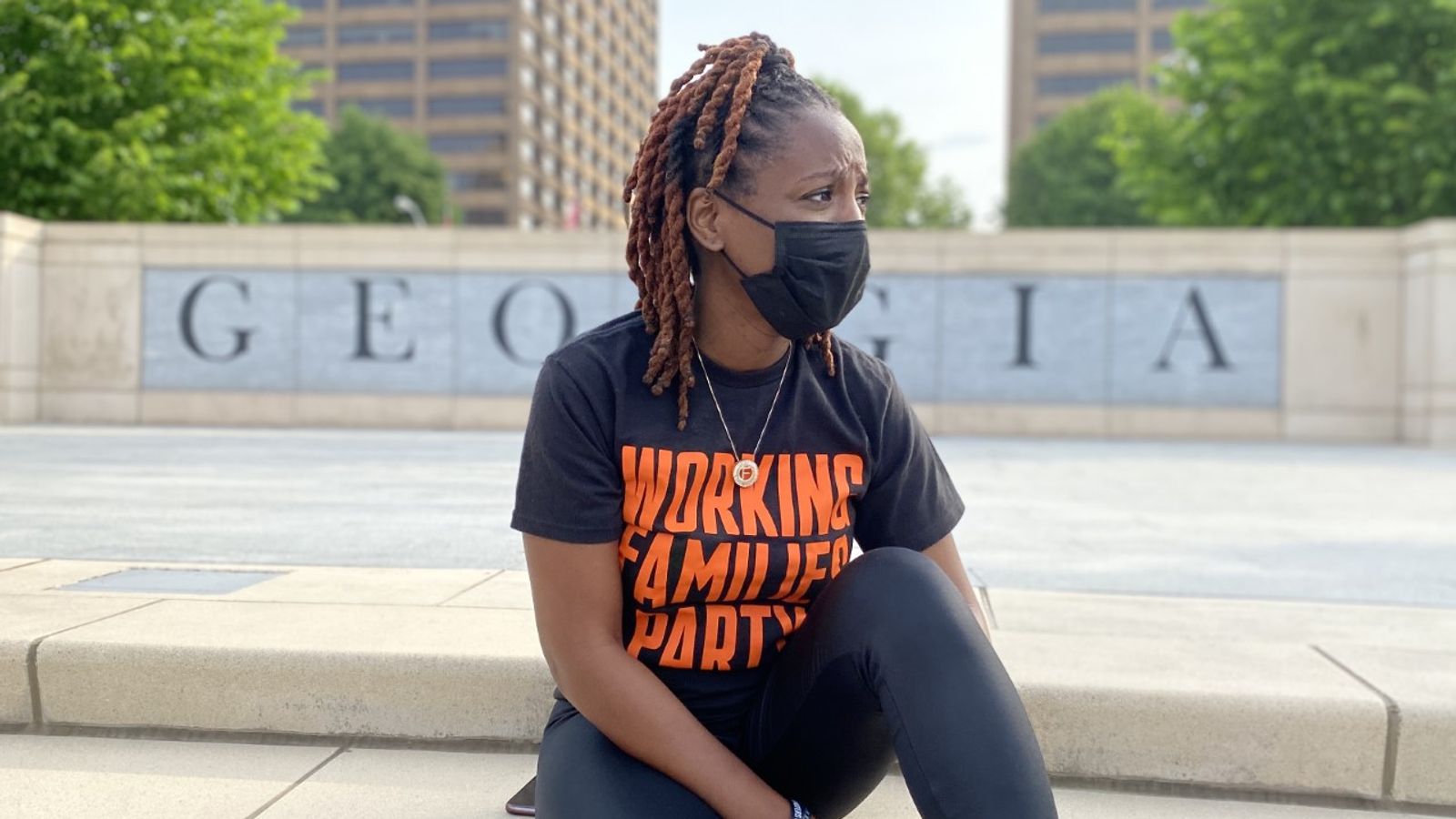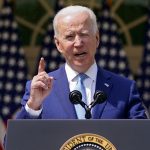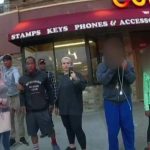President Joe Biden spent his 100th day in office in the place which propelled him to the White House.
Georgia flipped blue in November after nearly two decades as a Republican stronghold.
But more than that, it was January’s runoff elections here, won by Senators Jon Ossoff and Raphael Warnock, that shifted control of the US Senate to the Democrats.
Mr Biden came to say “thank you” to the people who have given the Democrats the razor thin majority on Capitol Hill and the ability to push through change.
The first 100 days
So how has the president fared in his first 100 days?
Not far from his late night drive-in rally is the Georgia town of Stone Mountain. When the president says the country is at a “point of inflection”, here, they know what he means.
These quiet streets were the scene, last year, of angry protests. The backdrop was the town’s controversial history. With the carvings on the mountain of confederate generals, this was, once, the place where the Ku Klux Klan lingered.
At the local martial arts club, instructor Walter Maddox is relieved that all that division is, he hopes, behind them.
His focus is his business – and the new president, he says, has delivered.
“Everything that he initiated to do is just to take time. It’s like you said, he’s stepping into a lot of things. It was a lot of turmoil, just a lot of tragedy. And I think in time, things will heal and things will definitely get better. We just got to be patient and just give him a chance to work it out,” he says.
It was the one-off federal government payment of $1,400 – part of the multi-trillion dollar coronavirus recovery plan – which saved him.
“Money straight into your bank account?” I ask.
“Straight into my bank account. I didn’t have to look for it or whatever,” he says.
“That helped me tremendously. I was closed for six months. A lot of my colleagues here were closed for six months, and that was a hard time. Many people did lose their business, but thank God for the monies that were there; that the Congress had put into place and we were able to get that helped me survive.”
An opportunity for Trump?
Last year, the highway to Atlanta was peppered with huge BIDEN/HARRIS and TRUMP/PENCE billboards. They are gone now, but the divisions remain deep.
Young Republican activists, like Adam Keller, still believe the election was rigged despite evidence and investigations proving otherwise.
“Proven is a strong word because there’s a lot of fake news that’s out there,” Adam says.
“People can’t really trust. So whether it’s proven or not, the issue is trust. The trust in the election system has been severely crippled through this past election.”
He tells me the Biden administration policies are proof of his far-left agenda, driven by Vice President Kamala Harris, long seen as a radical socialist by Republicans.
But he sees it as an advantage, paving the way for the return of Trump.
“You have an administration saying that Biden is centrist, but his actions and his policies are so far left and when the middle see that, they are not really sure where to go,” he explains.
“So part of our agenda that we need to really get across… we need to find the middle again. We need to start reaching out to them; to become a little bit more centrist in our messaging. And then when they realise that our messaging is really what they want to hear, they’ll see.”
He argues that Donald Trump will never lose his base no matter what he does. So by shifting to the centre ground, he can easily pick up centrists upset by Joe Biden’s path.
Can bipartisanship work?
Outside Atlanta’s state capital there is a hint of one of the nationwide challenges. Lines of homeless people. It’s an issue made so much worse by a struggling economy and the pandemic. In America, there is no safety net if you fall.
Nearby we meet Fallon McClure, local attorney and democratic activist for the grassroots group the Working Families Party.
“I saw the speech,” she said. “Several times he mentioned bipartisanship and… wanting folks from the Republicans and the Democrats to come and talk to him. And… he essentially was like, ‘if you don’t like my plan, let’s come talk about it. We can debate it, but we just need to get things done’.”
She continued: “I think that’s the right approach. We do need to move together. But then… he has a majority in for a reason, right? Sometimes we’re not going to be able to move together and sometimes we just need to get things done. And I think he needs to recognise when… it’s not always going to be bipartisan.”
Old arguments
Back in Stone Mountain, we chatted with retired couple Curt and Sherrie Elliott, two of the 74 million people who voted for Donald Trump. The conversation was a hint that the old arguments, even if they betray the facts, are still there.
“Well, we’re not really impressed. First of all, he didn’t win the election,” Curt tells me.
“And secondly, right off the bat, he starts out with all these executive orders over overextending his power… I don’t feel like we’re any closer to unity at all, because… he’s doing things that are not what the Republicans were in favour of and wanted. So how in the world is he ever trying to achieve any type of bipartisanship?”
I ask about the remarkable success Joe Biden has had with the vaccine programme.
“We’re not sure if it works. It’s in an experimental stage. It’s not proven… No, we are not going to get the vaccine. There’s no way, they will have to hold us down and force us to get the vaccine,” says Curt.
His wife nods.
“America is on the move again” is Joe Biden’s core message.
Yet it still feels like it’s moving in two different directions. Unity or even reconciliation feels far off.






















